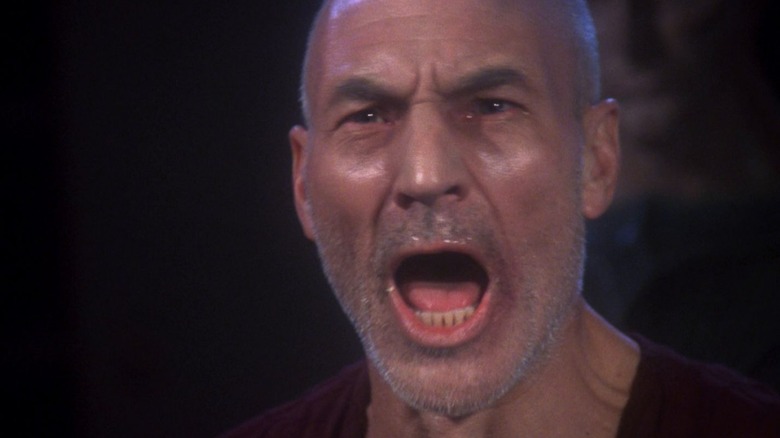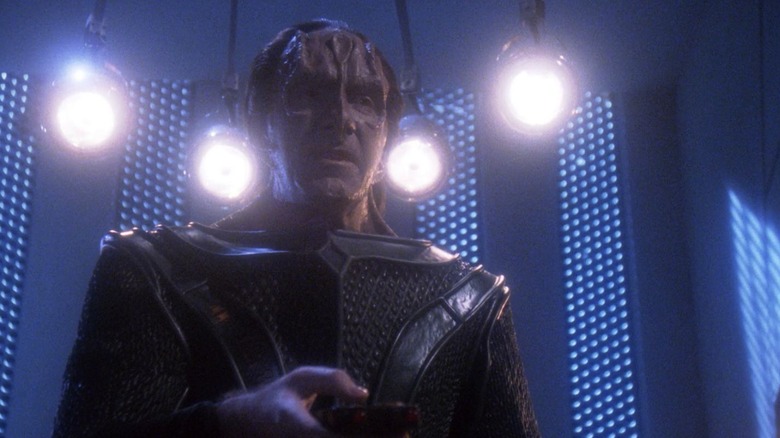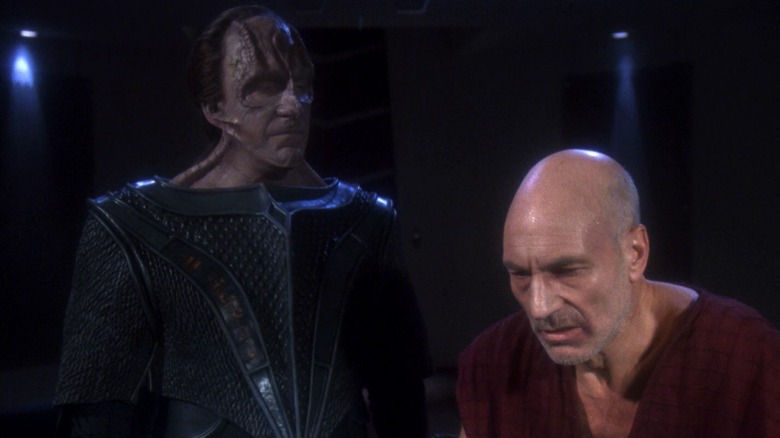Star Trek: Captain Picard's 'There Are Four Lights' Line, Explained
You've likely seen the meme circulating online: Captain Picard (Patrick Stewart), unshaven, haggard, with flecks of spit on his mouth, yelling the phrase "THERE! ARE! FOUR! LIGHTS!" Even those who haven't watched "Star Trek: The Next Generation" may find themselves taken aback by the reference, as Picard is well known, even outside Trekkies' circles, as being stern and dignified. What was happening to Picard that he was so gaunt, and what does that phrase mean?
As any Trekkie can tell you, the phrase comes from the "Star Trek: The Next Generation" episode "Chain of Command" (December 14 and 21, 1992), a two-part episode from the show's sixth season. In the first part, Picard, Worf (Michael Dorn), and Dr. Crusher (Gates McFadden) are ordered off the U.S.S. Enterprise to secretly investigate a potential metagenic weapon being developed by the Cardassians. They have to don all-black catsuits and covertly infiltrate a remote cave on a distant planet, looking for evidence. It's dangerous and serious, and no one is excited to be there. Back on the Enterprise, Picard has been replaced by Captain Jellico (Ronny Cox), a cold, rule-oriented captain with a stressful command style. Jellico reminds the Enterprise crew, and the viewers, that Starfleet officers are mere employees, and that managers can be replaced at Starfleet's whims.
At the end of the first part, it's revealed that the metagenic weapon was just a ruse, a trap constructed by the Cardassians. Picard is kidnapped before he can escape, and finds himself in the captivity of one Gul Madred (David Warner). Madred needs information about a nearby Federation planet that the Cardassians militarily covet ... and Madred will use whatever means at his disposal to get the information. The second part of "Chain of Command" is mostly about how Madred tortures, taunts, and mocks Picard to get information.
But maybe it wasn't information he was after ...
Picard is tortured in Chain of Command, Part II
Gul Madred uses just about every torture in the book. He implants Picard's body with an agony-inducing device that he can activate by remote control. If Picard doesn't say something he wants to hear, Madred can simply push a button, and Picard will fall over in pain. Madred isn't just interested in information, though. Indeed, he barely seems in a hurry. He takes pleasure in torturing Picard. The Cardassian begins mocking the Captain, referring to him only as "human," and showing off his handiwork to his nine-year-old daughter. The daughter is unfazed, as her father explains that humans don't feel love or emotions the way Cardassians do. Madred feeds Picard revolting foods, dangles him by his wrists, and leaves him to sleep on the floor.
In a recurring test, Madred's real motives come into focus. There are four bright spotlights high on the wall behind Madred. He stands in front of them, turns them on, and asks Picard how many he sees. Picard says there are four. Madred activates the agonizer. No, he corrects Picard, there are five lights. Madred insists Picard tell him there are five lights. This is not a mission of tactics or a quest to retrieve information. This is about strength of will. Madred's goal is to break Picard's spirits.
At the end of the episode, the Enterprise has gotten the drop on the Cardassians and located Captain Picard. He is going to be rescued. Picard doesn't know this yet, though, so Madred will play one final game. He leans in close, and makes an offer. He'll be set free and given a new home ... if he admits he sees five lights. For a moment, Picard stares at the lights, finally unsure. Maybe ... maybe there are five lights. It's at that moment that soldiers enter the room to escort Picard back home.
As he limps away, Picard turns and insists, "THERE! ARE! FOUR! LIGHTS!"
His resolve is returned.
Star Trek is directly referencing George Orwell's 1984
Although, not fully. In an epilogue, Picard admits that his spirits were indeed broken. There was a moment, he says, that he saw five lights. Madred's cruelty worked. It's a chilling conclusion to one of the best episodes of the series.
Readers of George Orwell's "Nineteen Eighty-Four" — and indeed, anyone familiar with the machinations of propaganda — will certainly understand what Gul Madred is doing. Some more context: Madred is a higher-up in the Cardassian chain of command, hailing from a society that values military might and loyalty to the state. The Cardassians are a clear analog for the Nazis, and it's later explained that they militarily occupied the planet Bajor, exterminating a great percentage of the population. They are a manipulative, totalitarian state that regularly spews propaganda. The state lives above everything in Cardassian society.
The mathematical falsehood of 2+2=5 is a common one in criticisms of propaganda. Going back to the 18th century, the equation has come to represent the people surrendering their free will to the state, an evil entity that is controlling the nature of the truth. In these regimes, if the state says that 2+2=5, then that is the new truth. Never mind that it is self-evidently incorrect, one cannot disagree with the state. George Orwell famously employed "2+2=5" in "Nineteen Eighty-Four," wherein several characters note that two plus two could indeed equal five if the government decreed it. It wasn't important that the government change physical reality, just that the populace believed its version of it.
When Gul Madred was showing Picard the four lights, he stood in the center, with two on his left, and two on his right. He was the fifth light. Two plus two equals five. Madred was a symbol for a totalitarian's regime demanding that the citizenry believe a lie. Rulership is not about military conquest, ownership of land, or control of weapons. It's about forcing the citizens to believe — really believe — in a false reality. The writers of "Chain of Command" knew what they were doing.


